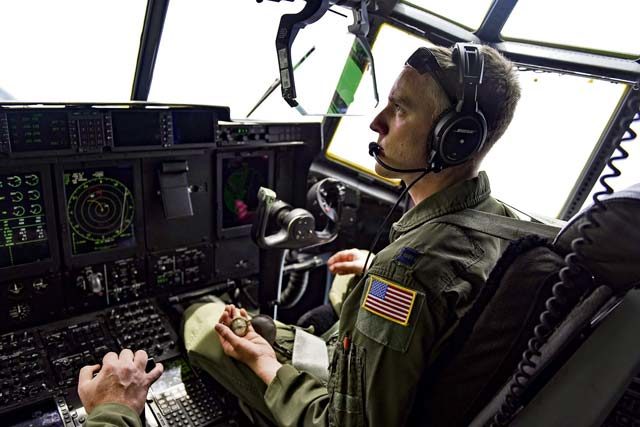
War debris and blood-soaked sand cover the shore. Naval vessels operating in pairs with nets between them gather bodies from the water. A grim site for Donald Coffey. The aftermath of the invasion was the first thing he saw when arriving to the beach front in Normandy, France, 73 years ago. The next thing was a half-track striking an underwater mine and exploding in front of him. The beach free of enemies, but not free of hazards.
Before Donald enlisted, he delivered ice cream in Iowa City, Iowa. Then the United States implemented the draft, but Donald volunteered and soon became a half-track driver for the U.S. Army’s 24th Cavalry Reconnaissance Squadron Mechanized.
“He was there when the cavalry went from having horses to transitioning into a mechanized force,” said Capt. Matthew Coffey, 37th Airlift Squadron pilot and Donald Coffey’s grandson.
A week and a half after D-Day, Donald’s unit arrived in Normandy. And although the worst part of the invasion was over, the fight still continued.
“He arrived onto Utah Beach and his unit was given orders to take the Cherbourg Peninsula,” said Matthew. “This was after the initial invasion, but it was when we were trying to put as many forces in that area as possible so they could start the liberation of France.”
His unit established a headquarters in Saint-Lo, where they moved artillery shells from the headquarters to the front.
“An artillery shell landed near him while he was carrying a box with another soldier,” said Matthew. “The other soldier was killed and my grandfather was significantly wounded. When the medics came by, they said he was too far gone to save.”
Donald then responded to the medic, “The hell I am!” and the medic returned to help him. After battlefield surgeons treated his abdominal wounds, Donald was taken to a hospital in England and eventually evacuated back to the states where he recuperated.
Both of Matthew’s parents were in the Air Force, and now Matthew flies the C-130J Super Hercules at Ramstein.
“There was a little bit of a legacy of military service that began with my grandfather,” said Matthew.
When Matthew had the opportunity to become a C-130 pilot, he said there was one training deployment he sought to do – fly over Normandy.
Matthew’s ambition came to light on May 29, when he and his colleagues flew out to Cherbourg, France, to take part in the D-Day celebration for the 73rd anniversary.
“I wasn’t expecting to go out to Normandy,” he said. “Our squadron has a very high operational tempo and there’s no guarantee what training deployment opportunities you may have. To go out to Normandy and have the opportunity to lead formations was something that I will always treasure and never forget.”
Although Matthew’s grandfather has passed away, a piece of Donald was with him while flying over Normandy.
“A few years ago when I graduated from pilot training, my uncle gave me a compass,” said Matthew. “That compass was the one my grandfather landed with in Normandy.”
He flew over Normandy with the compass in-hand to honor his grandfather.
“It meant a lot personally to be able to celebrate my grandfather in that way,” he continued. “To have a memento to fly with that he carried in that same spot, but I think it also meant a lot to my family who don’t have the chance to go out to that location and see what I was able to see. Our grandfather still has a lot of impact on our family.”
On the last day of Matthew’s time in Normandy he visited Utah Beach, the same beach his grandfather landed on all those years ago.
“I can’t begin to imagine what he saw, but I still felt a connection to that place through him.”


